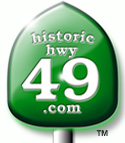                    |
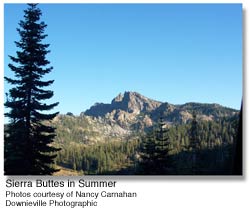
Like
the mystical village of Brigadoon time almost stands still. Sierra
County today remains much as it was over 100 years ago when gold
was discovered in November,1849 in the North Fork Yuba River.
The Washoe and Maidu Indians, early gold miners, loggers and ranchers
have left behind, for us to enjoy, a magnificent window into the
past. Founded in 1852 and named for the Sierra Buttes, Sierra
County is located in the northern section of the 'Golden Chain
Hwy', Historic Highway 49.
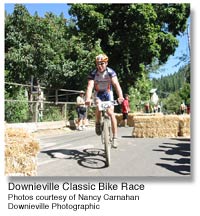 Leave
the shopping malls, crowds of people, long lines and traffic behind.
Meander through time while dining, shopping and lodging in comfortable
historic buildings in the quaint towns along Hwy. 49 in Sierra
County. Leave
the shopping malls, crowds of people, long lines and traffic behind.
Meander through time while dining, shopping and lodging in comfortable
historic buildings in the quaint towns along Hwy. 49 in Sierra
County.
From craggy peaks, water falls and
untamed rivers of the Sierra Buttes to the largest alpine valley
in North America, dropped by the same faulting that raised the
Sierra Nevada, you will find every imaginable recreational sport
you desire. Mother Nature provides an exceptionally beautiful
backdrop for each season. If recreation and relaxation are what
you're looking for, then Sierra County will fulfill your every
dream.
It was a direct result of the discovery
and continuous search for gold in California, that the development
of Sierra County began. As the roads improved, people began to
travel to the more primitive environment to enjoy the beauty and
wildlife. In the 1800's a 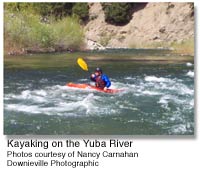 surge
of interest arose from the city people for recreation and relaxation
as a temporary relief from the frantic pace of urban life. By
1926 many popular resorts were constructed for the purpose of
fishing, swimming, boating and lodging. Bassett's Station was
built over 125 years ago at the intersection of Hwy. 49 and Gold
Lake Road to provide a rest stop and supply point for travelers
and still continues today. surge
of interest arose from the city people for recreation and relaxation
as a temporary relief from the frantic pace of urban life. By
1926 many popular resorts were constructed for the purpose of
fishing, swimming, boating and lodging. Bassett's Station was
built over 125 years ago at the intersection of Hwy. 49 and Gold
Lake Road to provide a rest stop and supply point for travelers
and still continues today.
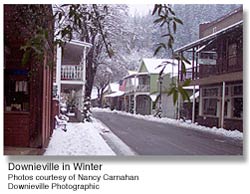
Named for Major Wm. Downie, leader
of the first gold discovery party in Sierra County. Founded in
1849 as a gold mining town, and now the County seat of Sierra
County. By May of 1850 Downeiville had 15 hotels and gambling
houses, 4 bakeries and 4 butcher shops. By the mid 1850's Downieville
was California's 5th largest town.
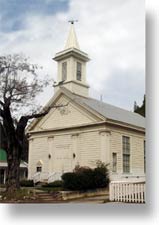 Nestled
in a tree-lined canyon alongside the North Fork Yuba River and
the Downie River on Hwy 49. Downieville is considered the least
changed town in all the Gold Rush towns in California. Walk
the narrow streets and wooden sidewalks as you browse through
unique gift and antique shops. Visit the many historical landmarks.
Dine in historic buildings along the river while you enjoy a wealth
of history at every turn. Nestled
in a tree-lined canyon alongside the North Fork Yuba River and
the Downie River on Hwy 49. Downieville is considered the least
changed town in all the Gold Rush towns in California. Walk
the narrow streets and wooden sidewalks as you browse through
unique gift and antique shops. Visit the many historical landmarks.
Dine in historic buildings along the river while you enjoy a wealth
of history at every turn.
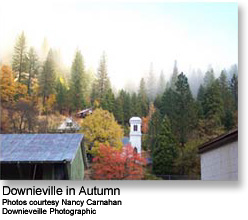
POINTS
OF INTEREST
|
• |
Main Street
- Historically narrow and lined with turn of the century
structures, complete with wooden boardwalks |
|
• |
The Masonic
Hall - Built in 1864 and the oldest building in town renovated
Bush and Heringlake Country Inn - Historically used as
a mercantile store and Wells Fargo Express and Company
stage coach stop in the 1870's |
|
• |
North Yuba
Art Center |
|
• |
Sierra Buttes |
|
• |
Gold Mines |
|
• |
Kentucky
Mine Museum |
|
• |
Waterfalls |
SIERRA CITY
Established as a mining town in 1850.
By 1852 Sierra City had 2 large buildings, a bakery shop and several
gambling houses and saloons. Miners were busy retrieving gold
from several tunnels in the nearby Sierra Buttes. In the winter
of 1853 many buildings were crushed by an avalanche of snow, forcing
the inhabitants to rebuild at the present lower elevation. Today
it is easy to imagine yourself discovering gold in one of the
many mines, or helping to construct one of the first buildings
or tending bar at one of the saloons as you revisit time in Sierra
City.
SATTLEY, SIERRAVILLE
The Sierra Valley ranches, se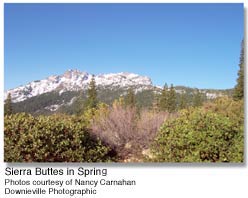 ttled
in the 1850's consist of the communities of Sattley, Sierraville,
Calpine and Loyalton. They provided dairy products, hay and
cattle for the Western Sierra County mines and the Comstock
Mines in the 1860's. One of the finest agricultural regions
in California in the 1880's. Since the mid 1850's cattle raising
and farming along with lumber was the main industry in the Sierra
Valley. Today the lumber industry is still an important aspect
of the economy and culture. You can also see remnants of both
early ranching and logging in these quaint towns. ttled
in the 1850's consist of the communities of Sattley, Sierraville,
Calpine and Loyalton. They provided dairy products, hay and
cattle for the Western Sierra County mines and the Comstock
Mines in the 1860's. One of the finest agricultural regions
in California in the 1880's. Since the mid 1850's cattle raising
and farming along with lumber was the main industry in the Sierra
Valley. Today the lumber industry is still an important aspect
of the economy and culture. You can also see remnants of both
early ranching and logging in these quaint towns.
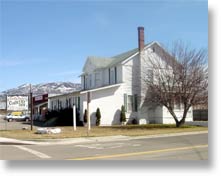 LOYALTON LOYALTON
Originally known as Smith's Neck and changed to Loyalton because
of the sentiment of loyalty to the Union Cause during the Civil
War in 1863. In 1901 Loyalton was incorporated as a dry town,
the size was set at 50.6 square miles. It was the second largest
city in California. Today, Loyalton is the largest city in Sierra
County.
POINTS
OF INTEREST
| |
The
grocery store in Sierraville |
| |
The
Brick Store in Loyalton |
| |
Numerous
historic barns and farm houses dating back to the last
century |
| |
The
Loyalton Museum |
| |
The
Sierra Valley Lodge - built as a recreational hall for
once thriving mill town - Calpine |
| |
The
Overlook on HWY 49, east of Yuba Pass - a spectacular
panoramic view of the argest valley in North America |
| |
The
Kyburz Flat interpretive area, on Henness Pass Road
east of Highway 89, explains the history of three different
peoples who inhabited this beautiful mountain meadow
starting 2,000 years ago. Maps and brochures are available
free of charge |
| |
The
Donner Camp Picnic Site, located five miles south of
the Sierra County line along Highway 89, looks out onto
a meadow where members of the Donner Party camped through
the winter of 1846. The Picnic area and restrooms are
wheel chair accessible |
| Things
to Do
Gold Panning,
rafting, boating, camping, waterskiing, hunting, hiking,
mountain biking, cross country skiing, snowmobiling,
snow shoeing, swimming, fishing, sailing, jet skiing,
site seeing, horseback riding, OHV areas. |
Facts
& Stats
| Population: |
3,300 |
| Elevation: |
2,500
ft. to
6,700 ft. |
| County: |
Sierra
County |
|
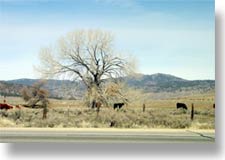
Right
Across the Line in
Plumas County
Vinton at the northern most point
of Hwy 49 and Graeagle north of Sierra City on Hwy 89 (go north
on Gold Lake Road at Bassett's) are both located in Plumas County.
One of California's best kept secrets, Plumas County offers
visitors rugged canyons, clear lakes, meandering streams teaming
with trout, meadows filled with wildflowers and forests equal
to any in California.
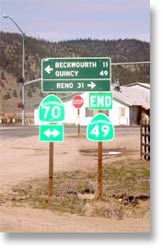
|